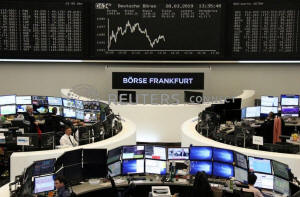|
Global stocks rise on trade optimism, set
for best quarter since 2012
 Send a link to a friend
Send a link to a friend
 [March 29, 2019]
By Ritvik Carvalho [March 29, 2019]
By Ritvik Carvalho
LONDON (Reuters) - Global stocks rose on
Friday on optimism over trade talks between the United States and China
and were set to post their best quarterly performance since 2012, while
global bond yields moved higher after a prolonged slide on growth
worries.
European markets opened higher, with the pan-European STOXX 600 index up
0.4 percent. France's CAC 40 index led gains, up 0.77 percent, while
Britain's FTSE 100 index was up 0.6 percent. Germany's DAX rose 0.4
percent. [.EU]
The rises came on the back of strong gains in Asia, where Chinese shares
climbed more than 3.1 percent after U.S. officials said China has made
proposals in trade talks with the United States on a range of issues
that go further than it has before, including on forced technology
transfer.
U.S. Treasury Secretary Steven Mnuchin said on Friday he had a
"productive working dinner" the previous night in Beijing, kicking off a
day of talks aimed at resolving the bitter trade dispute between the
world's two largest economies.

"Our base case is for the current tariff truce extension to yield only a
partial resolution, including select U.S. tariff rollbacks in exchange
for some Chinese concessions on imports, market access and intellectual
property," strategists at UBS wrote in a note to clients.
S&P 500 E-mini futures were up by 0.16 percent. Gains on Wall Street
overnight also bolstered investor optimism. [.N]
Despite recent turbulence, the S&P 500 has gained 12.3 percent so far
this quarter, which would mark its best quarterly performance since 2009
if sustained.
MSCI's All-Country World Index, which tracks shares in 47 countries, was
up 0.17 percent on the day. It was set to post its best quarterly
performance since March 2012.
German and French government bond yields were poised on for their
biggest monthly falls since June 2016, ending a month where heightened
anxiety about global growth prospects have sparked a flood into fixed
income globally.
Ten-year bond yields across the single currency bloc were marginally
higher in early trade, reflecting the firmer tone in stock markets. [GVD/EUR]
"We have moved a lot in the last two weeks so there is a bit of pause
for now," said Pooja Kumra, European rates strategist, TD Securities.
LIRA IN FOCUS
Analysts at UBS noted that pessimism in the bond market looked overdone,
citing three reasons: economic growth is slowing and not stalling,
central banks remain supportive of growth, and corporate earnings are
stronger than they appear.
The 10-year U.S. bond yield edged up to 2.406 percent from a 15-month
low of 2.352 percent touched on Thursday after an almost relentless fall
since the Federal Reserve's dovish tone last week sparked worries about
the U.S. economic outlook.
[to top of second column]
|

The German share price index DAX graph is pictured at the stock
exchange in Frankfurt, Germany, March 28, 2019. REUTERS/Staff

Investors have been on heightened alert since the yield on the
10-year note fell below that of the three-month U.S. Treasury paper
last Friday, an inversion of the yield curve that is widely seen as
an indicator of a recession.
Data on Thursday showed U.S. economic growth was slower than
initially thought in the fourth quarter, with GDP growth revised
down to an annualised 2.2 percent from an earlier reading of 2.6
percent.
In currencies, the euro was higher by 0.1 percent at $1.1226 though
it was headed for its worst month since October, weighed down by
fears about economic growth and cautious signals from the European
Central Bank. [FRX/]
The single currency has also been weighed down by speculation the
ECB will introduce a tiered deposit rate, providing a sign that
policymakers plant to keep interest rates low for longer.
Against a basket of peers, the dollar was flat.
The Turkish lira dropped 1.7 percent, a day after it had plunged 4
percent. President Tayyip Erdogan blamed the currency's weakness on
attacks by the West ahead of nationwide local elections on Sunday.
The British pound dipped 0.1 percent to $1.3025 after sliding more
than 1 percent the previous day.
Sterling had taken a knock as the prospect of a swift agreement on
Brexit faded with the British parliament yet again failing to agree
on a way forward. [GBP/]
Oil prices rose amid the ongoing OPEC-led supply cuts and U.S.
sanctions against Iran and Venezuela, putting crude markets on track
for their biggest quarterly rise since 2009. [O/R]

U.S. crude futures traded at $59.76 per barrel, up 0.8 percent on
the day and recovering from Thursday's low of $58.20.
Brent rose 0.4 percent to $68.10 per barrel.
(Reporting by Ritvik Carvalho; additional reporting by Dhara
Ranasinghe in London; Editing by Alison Williams)
[© 2019 Thomson Reuters. All rights
reserved.]
Copyright 2019 Reuters. All rights reserved. This material may not be published,
broadcast, rewritten or redistributed.
Thompson Reuters is solely responsible for this content. |